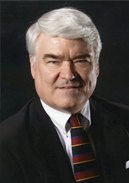© 2016 The Texas Lawbook.
By Natalie Posgate and Mark Curriden
(Aug. 18) – Texas’s highest ranking judge said he supports UNT Dallas College of Law’s first class of graduating students taking the Texas bar exam next July – even if the American Bar Association refuses to give its stamp of approval.

“I spoke at the UNT’s convocation, so I’ve already made up my mind. I’m for them,” Texas Supreme Court Chief Justice Nathan Hecht told The Texas Lawbook in an exclusive interview.
Hecht’s comments come in light of a recent recommendation by the ABA’s Law School Accreditation Committee to not accredit Dallas’ first public law school, citing low LSAT scores among the student body and inadequate funding.
Most state Supreme Courts, including in Texas, traditionally require law schools in their states to be accredited by the ABA before their graduates are able to take the bar examination and become practicing lawyers.
“I don’t understand the ABA’s concern of finances,” Hecht said. “UNT is a $500 million-plus operation.”
Hecht recalled two previous instances in which the Texas Supreme Court waived the accreditation requirement to allow students from unaccredited law schools to take the bar. One instance was for the now-defunct Reynaldo G. Garza School of Law in San Benito. The other was for the DFW Law School in Irving, which is known as Texas A&M University School of Law.
“The Supreme Court has done it every time it’s been asked when there were compelling circumstances,” Hecht said.
Hecht said he supports UNT’s efforts in addressing three major concerns the legal profession has with legal education:
· Providing a quality legal education for a small fraction of the cost of other law schools;
· Admitting more minority and working class students who do not have a shot at top ranked law schools; and
· Training students who have the desire to serve the public with their law degrees.
“Legal services are just unaffordable for the very poor, and pretty much at all for middle income individuals,” Chief Justice Hecht said.
The chief justice pointed out that UNT students pay 25 percent less than students at TSU’s Thurgood Marshall School of Law, half of the cost at most of the state-operated law schools and 75 percent less than those who attend law school at Baylor.
He said the lower the cost of legal education, the less debt new lawyers have to pay off. The need to pay off law school student loans prevents many newly-minted lawyers from accepting public service attorney positions.
The high debt, he said, means new graduates have “very little incentive to work for reduced fees clients” and thus the price of legal services goes up even higher.
Hecht said the ABA’s standards are problematic, noting that the association wants to improve diversity among law schools while simultaneously penalizing law schools for actually increasing their diversity by judging them primarily on high LSAT scores.
“They [the ABA] say to ‘close the justice gap,’ which is typically defined as an impossible problem and have a solution that is never going to be a reality,” Hecht said. “Here’s a school that’s actually trying to make it real.”
© 2016 The Texas Lawbook. Content of The Texas Lawbook is controlled and protected by specific licensing agreements with our subscribers and under federal copyright laws. Any distribution of this content without the consent of The Texas Lawbook is prohibited.
If you see any inaccuracy in any article in The Texas Lawbook, please contact us. Our goal is content that is 100% true and accurate. Thank you.
